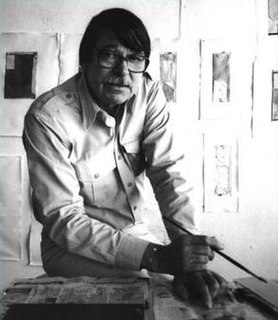A Quote by John Keats
Praise or blame has but a momentary effect on the man whose love of beauty in the abstract makes him a severe critic on his own works.
Related Quotes
The well-nurtured youth is one who would see most clearly whatever was amiss in ill-made works of man or ill-grown works of nature, and with a just distaste would blame and hate the ugly even from his earliest years and would give delighted praise to beauty, receiving it into his soul and being nourished by it, so that he became a man of gentle heart.
The analytical writer observes the reader as he is; accordingly, he makes his calculation, sets his machine to make the appropriate effect on him. The synthetic writer constructs and creates his own reader; he does not imagine him as resting and dead, but lively and advancing toward him. He makes that which he had invented gradually take shape before the reader's eyes, or he tempts him to do the inventing for himself. He does not want to make a particular effect on him, but rather enters into a solemn relationship of innermost symphilosophy or sympoetry.
Anything that is beautiful is beautiful just as it is. Praise forms no part of its beauty, since praise makes things neither better nor worse. This applies even more to what it commonly called beautiful: natural objects, for example, or works of art. True beauty has no need of anything beyond itself.
The man who works recognizes his own product in the world that has actually been transformed by his work. He recognizes himself in it, he sees his own human reality in it he discovers and reveals to others the objective reality of his humanity of the originally abstract and purely subjective idea he has of himself
When a natural discourse paints a passion or an effect, one feels within oneself the truth of what one reads, which was there before, although one did not know it. Hence one is inclined to love him who makes us feel it, for he has not shown us his own riches, but ours. ...such community of intellect that we have with him necessarily inclines the heart to love.
Superstition, in all times and among all nations, is the fear of a spirit whose passions are those of a man, whose acts are the acts of a man; who is present in some places, not in others; who makes no places holy and not others; who is kind to one person, unkind to another; who is pleased or angry according to the degree of attention you pay him, or praise you refuse to him; who is hostile generally to human pleasure, but may be bribed by sacrifice of a part of that pleasure into permitting the rest. This, whatever form of faith it colors, is the essence of superstition.
When [beauty pornography is] aimed at men, its effect is to keep them from finding peace in sexual love. The fleeting chimera of the airbrushed centerfold, always receding before him, keeps the man destabilized in pursuit, unable to focus on the beauty of the woman--known, marked, lined, familiar—-who hands him the paper every morning.





































